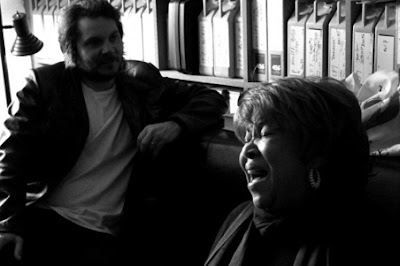Over the course of a remarkable career, both with her family band the Staple Singers and as a solo artist, gospel-soul icon Mavis Staples has bravely explored the frustrations, sorrows and then joys of the African-American freedom fight. But, lest we forget, she can still rock it.
“Last Train,” from Staples’ most recent album, proves the point.
The song (originally the opener on Allen Toussaint’s signature 1975 recording Southern Nights) is part of a diverse mixture of material on Staples’ You Are Not Alone — a credit to producer Jeff Tweedy, frontman of the Grammy-winning Wilco. Tunes from John Fogerty (“Wrote a Song for Everyone”), Randy Newman (“Losing You”) and Tweedy himself (the title track) can be found sprinkled in amongst the expected spirituals — beginning with “Don’t Knock,” written by her father Roebuck “Pops” Staples, the late patriarch of the Staple Singers. But it is here, on Toussaint’s breathlessly propulsive “Last Train,” that Staples finds perhaps the most radio-ready cut she’s made since 1972’s No. 1 hit “I’ll Take You There.”
Of course, “Last Train” — with its memorable outbursts of railroad-related onomatopoeia — comes off, at first, like a novelty, something for kids. But repeated listenings, in particular in context with the rest of Staples’ spirit-lifting album, illustrate how it so perfectly fits the theme of staying true, and of perserverance.
Staples, even after countless recordings over her 71 years, can still give herself over to the track’s ingratiating, chugging rhythms — huffin’ and puffin’, she cries, as saucy backup singers Kelly Hogan and Nora O’Connor join in — and, in so doing, uncovers the redemptive theme of moving on toward salvation.
As with much of this seemingly offbeat collaboration with Tweedy, issued last September on Anti- Records, there is a newfound muscular glint to the music surrounding her. Wilco (save for guitarist Nels Cline) appear throughout, with a notable contribution from Patrick Sansone on keyboards and vibes. They combine with members of Staples’ touring group to create a tougher sound, something resolute and spare. This seemless transition is a credit both to the deft musicianship in the room, and to Staples — who had similar successes on shared projects from Prince to Bob Dylan to Curtis Mayfield, among others.
Yet, for a time, Mavis’ career had stalled. Only recently has she experienced a popular resurgence, beginning — half a century after the Staples helped define the black struggle for equality — with her brilliant comeback recording of Civil Rights-themed songs with Ry Cooder in 2007. There followed the career-encapsulating live album Hope at the Hideout in 2008 and, more recently, appearances at such of-the-moment venues as Lollapalooza and the Wilco-curated Solid Sound Festival.
Can a long-awaited return to the singles chart be far behind? (After all, You Are Not Alone started out as Staples’ highest Billboard album debut ever.) Listening to her tear through this Toussaint tune, I wouldn’t count out the indomitable Mavis Staples.
- Nick DeRiso’s Best of 2015 (Rock + Pop): Death Cab for Cutie, Joe Jackson, Toto + Others - January 18, 2016
- Nick DeRiso’s Best of 2015 (Blues, Jazz + R&B): Boz Scaggs, Gavin Harrison, Alabama Shakes - January 10, 2016
- Nick DeRiso’s Best of 2015 (Reissues + Live): John Oates, Led Zeppelin, Yes, Faces + others - January 7, 2016



